中考英语动词时态填空及答案
- 格式:doc
- 大小:142.50 KB
- 文档页数:11
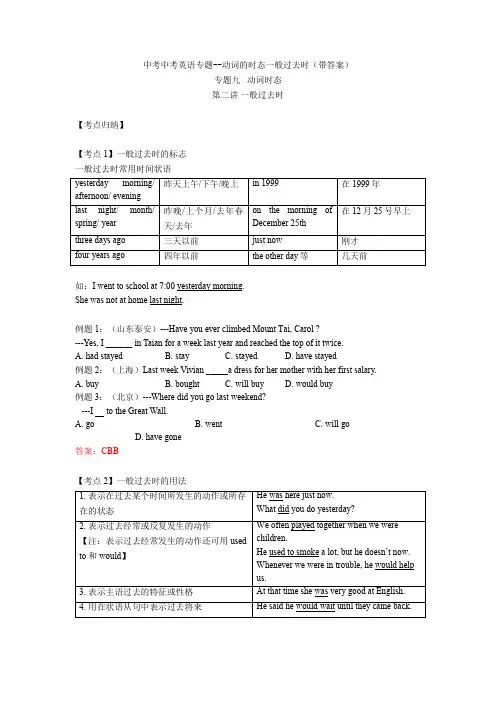
中考中考英语专题--动词的时态一般过去时(带答案)专题九 动词时态 第二讲 一般过去时【考点归纳】【考点1】一般过去时的标志 一般过去时常用时间状语如:I went to school at 7:00 yesterday morning. She was not at home last night.例题1:(山东泰安)---Have you ever climbed Mount Tai, Carol ? ---Yes, I ______ in Taian for a week last year and reached the top of it twice. A. had stayed B. stay C. stayedD. have stayed 例题2:(上海)Last week Vivian _____a dress for her mother with her first salary. A. buyB. boughtC. will buyD. would buy例题3:(北京)---Where did you go last weekend? ---I to the Great Wall. A. go B. wentC. will goD. have gone 答案:CBB【考点2】一般过去时的用法例题1:(湖北鄂州)--- I remember there _____ a lot of fish in Yanglan Lake. Now it has been polluted.---What a pity! I think we should play a role in protecting the environment.A. are used to haveB. are used to beC. used to haveD. used to be例题2:(江苏无锡)My mind wasn’t on what he was saying so I’m afraid I ____ half of it. A. missed B. was missing C. will miss D. would miss例题3:(河南)---There is someone knocking at the door.---It must be the computer repairman. I _____him to come to fix my computer.A. callB. have calledC. calledD. will call答案:DAC【考点3】一般过去时之be动词1. be动词的过去式形式 (表示过去存在的状态)2. be动词的句式变换例题1:---Where were you last night?---I _____ in the Capital museum.A. amB. will beC. wasD. have been答案:C【考点4】一般过去时之实义动词1. 实义动词的过去式形式规则动词的过去式不规则变化动词的过去式2. 实义动词的句式变换例题1:Hello! I’m very glad to see you. When ______ you_____ here?A. did; arriveB. will; arriveC. have; arrivedD. are; arriving 例题2:(辽宁丹东)---I have ever seen Alice in Wonderland II (爱丽丝梦游仙境II).---When ______ ?---Two weeks ago.A. did you see itB. have you seen itC. do you see itD. will you see it 例题3:(宁夏)---You can’t smoke here.---Sorry, I______ the sign.A. don’t seeB. didn’t seeC. haven’t seenD. won’t see例题4:(山东菏泽)---Oh no, I can’t find my mobile phone.---Well, where _____ you last put it ?A. haveB. doC. did例题5:(四川绵阳)---Don’t see the sign“ No Parking!” on the right?---Sorry, I _____. But now I know parking here is not right.A. don’tB. didn’tC. hadn’tD. doesn’t答案:AABCB【考点5】一般过去时的易错点]He put on his coat and例题1:(江苏连云港)---Did Billy and Anna find a way out at last ?---Yes, they _____ a plan and did it.A. were working outB. worked outC. are working outD. have worked out 例题2:(湖南长沙)---Your coat fits you well.---Thank you. I _______ it when I was on a vacation.A. have boughtB. buyC. bought例题3:改错1).Did Li Ming studied E nglish this morning?2).Was the girl had seafood last night?3). Uncle Liu wasn’t went to Shanghai last Monday.4). He wents home at 6:00 last month.5). There is a football match on TV yesterday evening, but I had no time to watch it.答案:BC1).Did Li Ming study English this morning?2).Did the girl have seafood last night?3). Uncle Liu didn’t go to Shanghai last Monday.4). He went home at 6:00 last month.5). There was a football match on TV yesterday evening, but I had no time to watch it.【注】dreamed/dreamtpt] retold[,ri:'t【基础演练】【教学建议】建议此部分用作当堂检测练习,复习完一般过去时的相关考点以后,即刻让学生完成一般过去时的综合练习。
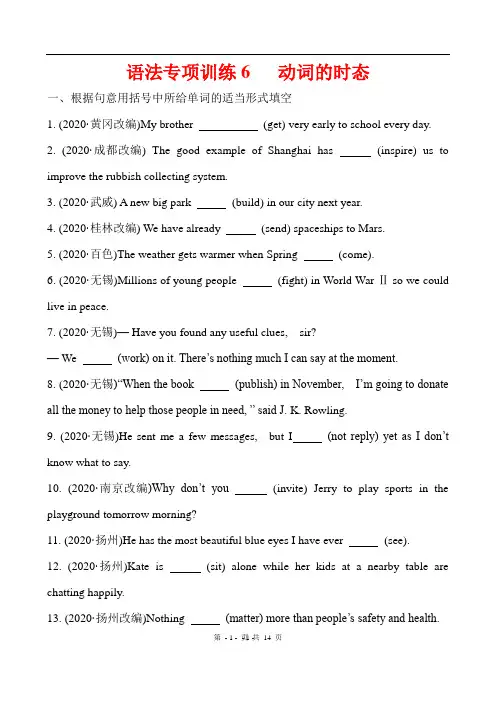
语法专项训练6动词的时态一、根据句意用括号中所给单词的适当形式填空1. (2020·黄冈改编)My brother (get) very early to school every day.2. (2020·成都改编) The good example of Shanghai has (inspire) us to improve the rubbish collecting system.3. (2020·武威) A new big park (build) in our city next year.4. (2020·桂林改编) We have already (send) spaceships to Mars.5. (2020·百色)The weather gets warmer when Spring (come).6. (2020·无锡)Millions of young people (fight) in World War Ⅱ so we could live in peace.7. (2020·无锡)— Have you found any useful clues, sir?— We (work) on it. There’s nothing much I can say at the moment.8. (2020·无锡)“When the book (publish) in November, I’m going to donate all the money to help those people in need, ” said J. K. Rowling.9. (2020·无锡)He sent me a few messages, but I(not reply) yet as I don’t know what to say.10. (2020·南京改编)Why don’t you (invite) Jerry to play sports in the playground tomorrow morning?11. (2020·扬州)He has the most beautiful blue eyes I have ever (see).12. (2020·扬州)Kate is (sit) alone while her kids at a nearby table are chatting happily.13. (2020·扬州改编)Nothing (matter) more than people’s safety and health.14. (2020·盐城改编)Scientists say that music makes our brain “feel happy” andit (explain) the importance of music in cultures all over the world.15. (2020·常德)—What’s he doing?—He (use) the computer.16. (2020·永州)—How does your English teacher go to school?—She usually(drive) to school.17. (2020·永州)My family (go) to Yongzhou botanical garden(植物园) last weekend.18. (2020·大庆)My mum hopes that I (be) happy and healthy in the future.19. (2020·达州改编)—Jenny, do you know if your mother (come) back tomorrow?— Sorry, I don’t know. As soon as she (come) home, I will tell her to call you.20.(2020·重庆B卷改编)Don’t drink coffee before going to bed, oryou (not fall) asleep easily.二、动词应用阅读下面短文, 用括号内所给动词的适当形式填空, 必要时可加情态动词或助动词。
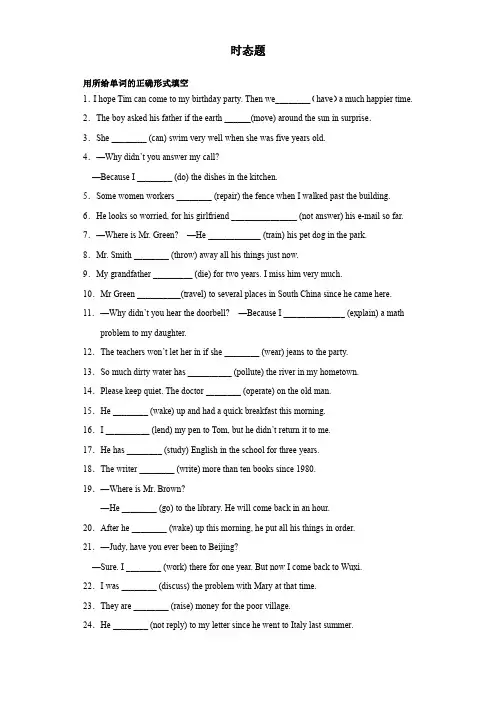
时态题用所给单词的正确形式填空1.I hope Tim can come to my birthday party.Then we________(have)a much happier time. 2.The boy asked his father if the earth______(move)around the sun in surprise.3.She________(can)swim very well when she was five years old.4.—Why didn’t you answer my call?—Because I________(do)the dishes in the kitchen.5.Some women workers________(repair)the fence when I walked past the building. 6.He looks so worried,for his girlfriend_______________(not answer)his e-mail so far. 7.—Where is Mr.Green?—He____________(train)his pet dog in the park. 8.Mr.Smith________(throw)away all his things just now.9.My grandfather_________(die)for two years.I miss him very much.10.Mr Green__________(travel)to several places in South China since he came here. 11.—Why didn’t you hear the doorbell?—Because I______________(explain)a math problem to my daughter.12.The teachers won’t let her in if she________(wear)jeans to the party.13.So much dirty water has__________(pollute)the river in my hometown. 14.Please keep quiet.The doctor________(operate)on the old man.15.He________(wake)up and had a quick breakfast this morning.16.I__________(lend)my pen to Tom,but he didn’t return it to me.17.He has________(study)English in the school for three years.18.The writer________(write)more than ten books since1980.19.—Where is Mr.Brown?—He________(go)to the library.He will come back in an hour.20.After he________(wake)up this morning,he put all his things in order. 21.—Judy,have you ever been to Beijing?—Sure.I________(work)there for one year.But now I come back to Wuxi.22.I was________(discuss)the problem with Mary at that time.23.They are________(raise)money for the poor village.24.He________(not reply)to my letter since he went to Italy last summer.25.My parents_________(fly)to Beijing last Saturday.They_________(come)back next week.26.The man________(become)rich when he was forty.27.All of them were________(sleep)at home when the flood came.28.Light_________(travel)much faster than the sound.29.Her father_______________(buy)her a nice present on her next birthday.30I promise I________________(send)you an email to explain all of these tomorrow.时态填空题答案一、用所给单词的正确形式填空1.I hope Tim can come to my birthday party.Then we________(have)a much happier time.【答案】will have【详解】句意:我希望蒂姆能参加我的生日派对。
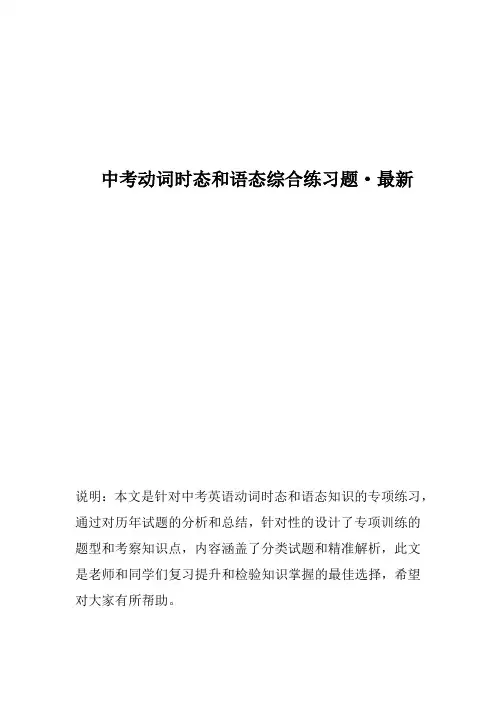
中考动词时态和语态综合练习题·最新说明:本文是针对中考英语动词时态和语态知识的专项练习,通过对历年试题的分析和总结,针对性的设计了专项训练的题型和考察知识点,内容涵盖了分类试题和精准解析,此文是老师和同学们复习提升和检验知识掌握的最佳选择,希望对大家有所帮助。
一、用所给动词的适当形式填空1.Summer _______(follow)spring.【答案】follows【详解】句意:春去夏来。
可知考查一般现在时态,说明一种客观事实,主语Summer 是第三人称单数,所以动词要用第三人称单数形式,故答案为:follows2.he students are often _______(divide(into several groups by the teacher before discussing the difficult questions in class.【答案】divided【详解】句意:在课堂上讨论难题之前,老师经常把学生分成几个小组。
divide“分开”,主语students与动词divide之间构成被动关系,用被动语态be done的结构,空格前已有助动词are,此空应填过去分词,故填divided。
3.Paper Shoot ________ (work) just like any other camera.【答案】works【详解】句意:Paper Shoot的工作原理和其他相机一样。
此处在句中作谓语,时态是一般现在时,主语是第三人称单数,动词work用第三人称单数形式,故填works。
4.Students will ________ (require) to understand and master the basics of home cooking .【答案】be required【详解】句意:学生将被要求了解和掌握家庭烹饪的基本知识。
根据“Students will be …to understand and master the basics of home cooking”及备选词可知,要求学生掌握这些技能,require“需要”,此处是被动语态,故此空应填过去分词,故填be required.st Saturday she ________ (stop) her car at some traffic lights because they were red, and then the car didn’t start again.【答案】stopped【详解】句意:上星期六,她在交通灯前停车,因为交通灯是红色的,然后车又发动不起来了。
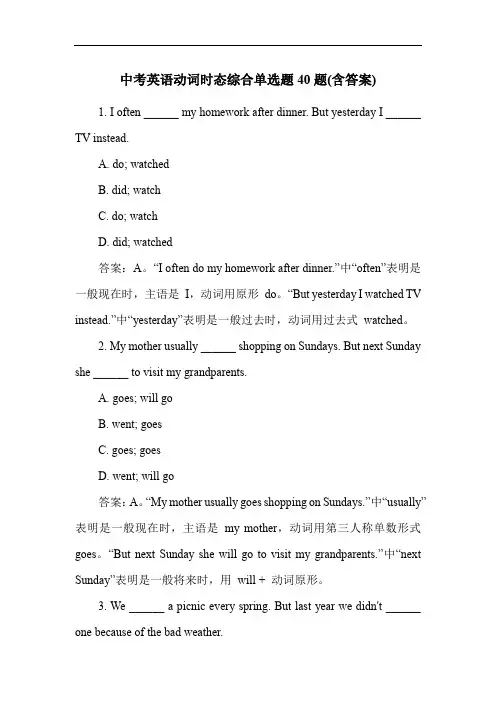
中考英语动词时态综合单选题40题(含答案)1. I often ______ my homework after dinner. But yesterday I ______ TV instead.A. do; watchedB. did; watchC. do; watchD. did; watched答案:A。
“I often do my homework after dinner.”中“often”表明是一般现在时,主语是I,动词用原形do。
“But yesterday I watched TV instead.”中“yesterday”表明是一般过去时,动词用过去式watched。
2. My mother usually ______ shopping on Sundays. But next Sunday she ______ to visit my grandparents.A. goes; will goB. went; goesC. goes; goesD. went; will go答案:A。
“My mother usually goes shopping on Sundays.”中“usually”表明是一般现在时,主语是my mother,动词用第三人称单数形式goes。
“But next Sunday she will go to visit my grandparents.”中“next Sunday”表明是一般将来时,用will + 动词原形。
3. We ______ a picnic every spring. But last year we didn't ______ one because of the bad weather.B. had; haveC. have; hadD. had; had答案:A。
“We have a picnic every spring.”中“every spring”表明是一般现在时,动词用原形have。
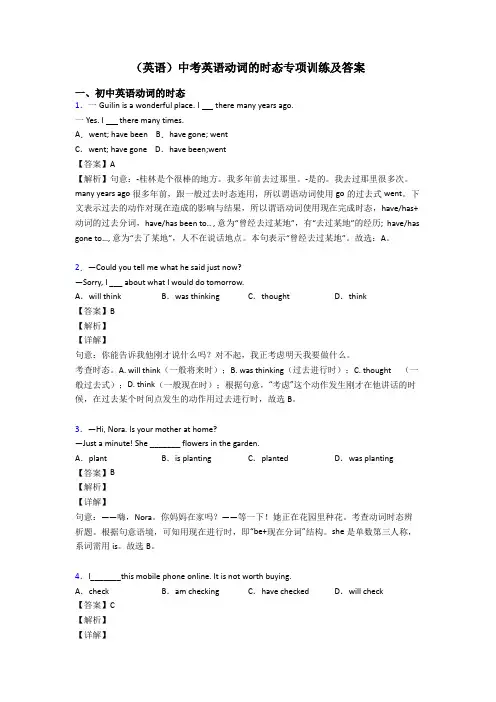
(英语)中考英语动词的时态专项训练及答案一、初中英语动词的时态1.一Guilin is a wonderful place. I there many years ago.一Yes. I there many times.A.went; have been B.have gone; wentC.went; have gone D.have been;went【答案】A【解析】句意:-桂林是个很棒的地方。
我多年前去过那里。
-是的。
我去过那里很多次。
many years ago很多年前,跟一般过去时态连用,所以谓语动词使用go的过去式went。
下文表示过去的动作对现在造成的影响与结果,所以谓语动词使用现在完成时态,have/has+动词的过去分词,have/has been to.. , 意为“曾经去过某地”,有“去过某地”的经历; have/has gone to…, 意为“去了某地”,人不在说话地点。
本句表示“曾经去过某地”。
故选:A。
2.—Could you tell me what he said just now?—Sorry, I ___ about what I would do tomorrow.A.will think B.was thinking C.thought D.think【答案】B【解析】【详解】句意:你能告诉我他刚才说什么吗?对不起,我正考虑明天我要做什么。
考查时态。
A. will think(一般将来时);B. was thinking(过去进行时);C. thought (一般过去式);D. think(一般现在时);根据句意,“考虑”这个动作发生刚才在他讲话的时候,在过去某个时间点发生的动作用过去进行时,故选B。
3.—Hi, Nora. Is your mother at home?—Just a minute! She _______ flowers in the garden.A.plant B.is planting C.planted D.was planting【答案】B【解析】【详解】句意:——嗨,Nora。
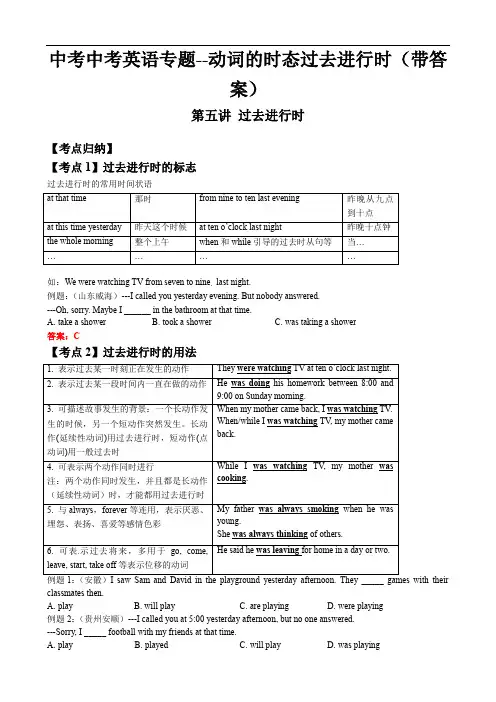
中考中考英语专题--动词的时态过去进行时(带答案)第五讲过去进行时【考点归纳】【考点1】过去进行时的标志过去进行时的常用时间状语如:We were watching TV from seven to nine last night.例题:(山东威海)---I called you yesterday evening. But nobody answered.---Oh, sorry. Maybe I ______ in the bathroom at that time.A. take a showerB. took a showerC. was taking a shower答案:C【考点2】过去进行时的用法He said he6. 可表示过去将来,多用于go, come,leave, start, take off等表示位移的动词with their classmates then.A. playB. will playC. are playingD. were playing例题2:(贵州安顺)---I called you at 5:00 yesterday afternoon, but no one answered.---Sorry, I _____ football with my friends at that time.A. playB. playedC. will playD. was playing例题3:(天津)My mother ______dinner when I got home yesterday.A. has cookedB. was cookingC. will cookD. cooks 答案:DDB【考点3】过去进行时的构成1. We were having a PE class at four yesterday afternoon.(改为否定句)We ______ ______ a PE class at four yesterday afternoon.2. Kate was reviewing her lessons at eight last night.(改为一般疑问句并做否定回答)________ Kate _______her lessons at eight last night?________, she ________.3. He ran in the park.(用at this time yesterday改写)He _______ ________in the park at this time yesterday.4. They were playing computer games at nine last night.(对划线部分提问)________ ________ they _______ at nine last night?5. I was reading a novel at three yesterday afternoon.(对划线部分提问)_________ ________ you ________ at three yesterday afternoon?答案:1. weren’t having 2. Was; reviewing; No; wasn’t 3. was running4. What were doing5. What were doing【考点4】过去进行时与一般过去时的区别例题1:(黑龙江哈尔滨改编)---Could you tell me where you _____Miss Gao just now ?---Certainly. In the principal’s office. They ____ happily at that time.A. find; are talkingB. were finding; were talkingC. found; were talking例题2:(黑龙江龙东)He ______ newspapers when the earthquake happened in Japan.A. was looking throughB. looked throughC. had looked through 例题3:(吉林)Steve ______ in the living room when his mother came in . A. was watchingB. watchesC. is watching 答案:CAA 【考点5】when 和while 的异同点2. 由when 引导的时间状语从句,主句用过去进行时,从句应用一般过去时;如果从句和主句的动作同时发生,两句都用过去进行时的时候,多用while 引导It He While he reading 【注:延续性动词和非延续性动词的区别】1) My wallet dropped on the ground ________ I was walking.2)________ he was reading, the telephone rang.3)________ the telephone rang, I was doing my homework.4) Were the students listening to the teacher carefully ________ the teacher was giving a lesson?5) Was she playing games ________ the bell was ringing?例题2:(福建漳州)---How did the accident happen ?---The girl _____Wechat(微信)while she was walking across the street.A. readsB. is readingC. was reading例题3:(山东济南)Sun Hai ______his mother make dinner when his father got home from work.A. was helpingB. helpsC. helpedD. is helping例题4:The student ______ to move the bag of rice _______ he heard the sound of a motorbike .A. was running; whenB. was running; whileC. runs; whenD. ran; while答案:1)when/ while 2) When/While 3) When 4) While 5)whileCAA【考点6】过去进行时的易错点【误】My mother is cooking when I got home.【正】My mother was cooking when I got home.【误】I read a story boo k at 9 o’clock yesterday evening.【正】I was reading a story book at 9 o’clock yesterday evening.1) She was done her homework when her mother came back.2) My mother slept when the telephone rang.3) He mending his car while his wife was cooking.4) My grandpa was buying a pig yesterday.例题2:(黑龙江大庆)---Where were you when I called?---I _____ on the bed.A. liedB. was lyingC. layD. was lieing答案:1) She was doing her homework when her mother came back.2) My mother was sleeping when the telephone rang.3) He was mending his car while his wife was cooking.4) My grandpa bought a pig yesterday.B【基础演练】【教学建议】建议此部分用作当堂检测练习,复习完过去进行时的相关考点以后,即刻让学生完成过去进行时的综合练习。
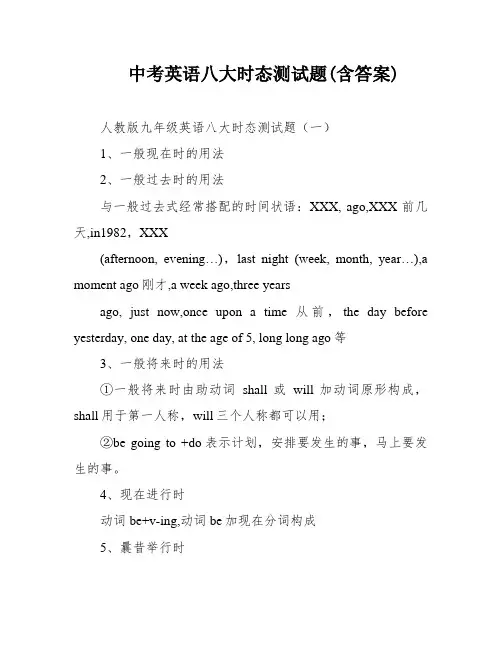
中考英语八大时态测试题(含答案)人教版九年级英语八大时态测试题(一)1、一般现在时的用法2、一般过去时的用法与一般过去式经常搭配的时间状语:XXX, ago,XXX前几天,in1982,XXX(afternoon, evening…),last night (week, month, year…),a moment ago刚才,a week ago,three yearsago, just now,once upon a time从前,the day before yesterday, one day, at the age of 5, long long ago等3、一般将来时的用法①一般将来时由助动词shall或will加动词原形构成,shall用于第一人称,will三个人称都可以用;②be going to +do表示计划,安排要发生的事,马上要发生的事。
4、现在进行时动词be+v-ing,动词be加现在分词构成5、曩昔举行时与过去进行时搭配的时间状语:(just)then那时,当时;XXX在这/那时XXX今世界战书;at nine在九点;last night昨晚;(at)this time XXX在今天这个时分但在很多情形下,没有透露表现工夫的状语,这时候需求经由过程高低文来透露表现。
6、过去将来时构成:一般过去将来时由should或would加动词原形构成,第一人称用should,其他人称用would,第一人称也能够用would.容身于曩昔某一时辰,从曩昔看将要产生的工作,经常使用于宾语从句中。
与曩昔未来时搭配的时间状语:the next day(morning, year…), the following month(week…)等7、现在完成时组成:目前完成时态是由“助动词have(has)+曩昔分词”组成,标记词:for, since, since…ago,yet8、过去完成时实战模仿()1. There _______ XXX.A. XXX()2. --- Who sings best in your class?--- Jenny _______.1XXX done()3. --- _____ the young girl _____ the old man clean his room every day?--- Yes, she does.A. Does; XXX; XXX; helpD. Do; helps()4. --- Can I go to Beijing for my holiday, Dad?--- You can when you _______ a bit older.A. will XXX()5. --- What does Linda often do in the evening?--- She often ____ her homework, but on the evening of March 12 she____TV.A. does; watchesB. is doing; watchedC. does; watchedD. is doing; was watching()6. XXX __around the sun.A. XXX()7. If he _______harder, he will catch up with us soon.A. XXX()8. --- Don’t forget to ask him to write to me.--- I won’t. As soon as he _____, I’ll ask him to write to you.A. XXX coming()9. --- Do you like this silk dress?--- Yes, I do. It _______ so soft and comfortable.A. is XXX felt()10. Oh, it’s you. I’m sorry I _______ know you _______ here.A. don’t; areB. didn’t; XXX’t; XXX’t; were() 11. XXX?2A. XXX() XXX XXX.A. XXX() 13. Some arein the XXX.A. swiming, playingB. swimming, plaiingC. swimming, playingD. swimming, plaing() 14.---Where is Dick?--- Heto the reading-room.A. has XXX() 15. Mark Twain, an American writer,XXX.A. knowsB. is known asC. is known toD. is known for () 16. I hope he will come to see me before XXX.A. XXX left() XXX.A. XXX() 18. I think sheright now.A. XXX readingD. read() 19. ---- Where are the children?---- Theya good time in the garden.A. XXX() 20. ----- Wheremy glasses? I can’t find them.---- Ithem on the bookshelf, XXX.A. you put, putB. you have put, have putC. have you put, putD. did you put, have put3() 21. When the police arrived, the manfor 10 minutes. A. diedB. was deathC. had diedD. had been dead() 22. By the time this talk is over, wea lot about the earth.A. will be XXX have learnt()23. XXX difficulties.A. helpedB. will helpC. helpD. were going to help() 24. ----Have you seen him today? ----Yes, Ihim this morning.A. has XXX() 25. Heworried when he heard this news.A. XXX() 26. XXX.A. XXX do()27. I don’t think that it’s true. He’XXX.A. XXX() 28. Have XXX Farm?A. XXX() 29. XXX?A. has, borrowedB. has, keptC. has, lentD. is, using() 30. Heto do this lessons at eight every evening.A. XXX() 31. XXX.A. are going to hasB. is going to haveC. are havingD. are going to have() XXX.A. XXX4() 33.heon well with his friends this term?A. Does, getsB. Does, getC. Is, gettingD. Is, geting() XXX? I can’t find it.A. XXX() XXX Saturday?A. XXX play() 36. The childrenat school now.A. XXX()XXX stories, but hea TV play these days.A. is writing, is writingB. is writing, writesC. writes, is writingD. writes, writes() 38. He said hethe league(联盟) for two years.A. has joinedB. has been inC. had been inD. joined() 39. XXX garden,she?A. XXX’t() 40. Whatyouto do to keep the room clean?A. do, haveB. does, haveC. did, haveD. are, have() 41. Some flowersby XXX already.A. have been XXX()42. When winter comes, XXX.A. are going toB. willC. will beD. would() 43. Ito the XXX.A. go, goB. am going, goC. go, am goingD. am going, am going() XXX future now,you?A. don’t think, XXX, aren’t5XXX, doD. aren’t thinking, are()45. XXX hehis way.A. would lostB. would loseC. is going toD. shall lose() 46. Weeach other since he left here.A. XXX’t XXX seen() 47. Mr. Smithout for a walk in the park every day.A. XXX go() 48. Hefrom home for a long time.A. has gone awayB. had gone awayC. has leftD. has been away()49. You mustn’t go too high, or youdangerous.A. will beB. areC. would beD. is going to() 50. We have known each other.A. since we were youngB. after we were youngC. when we are youngD. if we are young() 51. XXX work.A. XXX. is going to() 52. How long has this shop?A. be XXX() 53. Mr. Smithhere since he moved to his city.A. had XXX has lived()54. ----Have you read the newspaper?----No, I XXX’t.A. XXX()55. Our knowledge of the universeall the time. 6A. XXX() 56. She won’t go to the XXX.A. XXX()57. XXX.A. has been deadB. was deadC. has diedD. died() 58. Sheto the Great Wall several times.A. goesB. has goneC. wentD. has been() 59. XXX.A. XXX() 60. XXX book.A. XXX()61. Ithe bike for over four years.A. XXX()62. XXX.A. had visitedB. has visitedC. will visitD. would visit() 63. His motherthe Party last year. Shea Party member for a year.A. joined, wasB. has joined, isC. joined, has beenD. has joined, has been() 64. We don’t know if itthe day after tomorrow.A. XXX rain() 65. He said hehis life for his country.A. XXX givenD. would give()66. XXX.A. goB. goesC. wentD. is going() 67. Look, the XXX.7A. XXX() 68. Hein this school in 1958.A. XXX() XXX.A. will XXX() 70. XXX work in two days.A. had XXX finish()71. By the end of last week, XXX.A. would learnB. have learnedC. had learnedD. were learning () 72. When he left, his mother.A. XXX() 73. We’ll go to play with snow if XXX.A. XXX() XXX.A. XXX() 75. The trainwhen we got to the XXX.A. has just leftB. had just leftC. leavesD. left() 76. Dr Smith is not at home. Heto work.A. has goneB. has beenC. had beenD. had gone() 77. That man knows a lot about New York. I heard hebefore.A. had gone to the cityB. had been in thereC. had been thereD. had been New York() 78. The artistto Europe. He is there now.A. has goneB. has beenC. had goneD. had been8() 79. Miss Brown said XXX China before.A. has, goneB. has, beenC. had, goneD. had, been() XXX?A. is, doingB. was, doingC. did, doD. had, done() 81. Ito see the film because I have XXX.A. XXX’t gone() 82. The students will have a football match if XXX.A. will beB. would beC. wasD. is() 83. She asked me if Ithe story before.A. have readB. had readC. would readD. will read() XXX?A. are, doingB. did, doC. have, doneD. were, doing() 85. You can’t see him now because XXX.A. XXX having() XXX.A. XXX’t XXX() 87. Li Ping will visit the Great Wall as soon as hefree.A. will beB. isC. wasD. has been() 88. One day when Ithe post office Imy uncle.A. pass, seeB. was passing, sawC. passed, sawD. pass, saw () XXX.A. said, will makeB. said, madeC. said, had madeD. said, make() XXX.9A. are, haveB. were, haveC. were, to haveD. are, having () XXX.A. XXX. take a walkD. is taking a walk() 92. Mary is seven years old. Sheeight next year.A. XXX be() 93. A table and many XXX.A. wasB. wereC. are beingD. was being() 94. I’ll go with you as soon as Imy work.A. will XXX() 95. Treesgreen in spring.A. XXX XXX() 96. XXX Iin bed all day because I had a fever.A. XXX() 97. Hello, Mike. It’s you. Iyouin Beijing. How long have you been here?A. don’t know, XXX’t know, areC. XXX, areD. XXX’t know, were() 98. A: Whenagain? B: When he. I’ll let you know.A. he comes, comesB. will be come, will comeC. he comes, will comeD. will he come, comes() 99. The last bus. I had to walk home.A. had goneB. have goneC. wentD. has gone() 100. A: Are you making cakes?B:.A. Yes, I doB. Yes, I amC. Yes, I’mD. Yes, I’m making10()101. ----What time?----My watch.A. it is, stoppedB. is it, has stoppedC. it is, has stoppedD. is it, is stopping() 102. Whaton Sunday?A. does he sometimes doB. is he often doingC. has he doneD. is usually he do()XXX night?A. XXX, XXX, watchingC. XXX, XXX, XXX() 104. That Japanese knowsthe Salt Lake City. I XXX.A. a lot of, had been thereB. a lot about, had been thereC. lot, had been thereD. a lot of, had gone there() 105. As soon as we saw his face, XXX.A. XXX, wasB. know, wereC. know, wasD. know, were11参考答案1-10:DCABCDBCBC11-20:ABCCCBBCAC21-30:DDDDBDBDBD31-40:DCBCABCBAA。
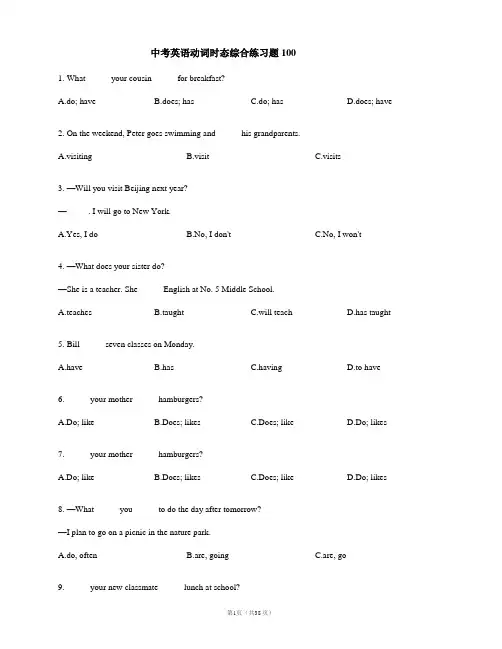
中考英语动词时态综合练习题1001. What _____ your cousin _____ for breakfast?A.do; haveB.does; hasC.do; hasD.does; have2. On the weekend, Peter goes swimming and _____ his grandparents.A.visitingB.visitC.visits3. —Will you visit Beijing next year?—_____. I will go to New York.A.Yes, I doB.No, I don'tC.No, I won't4. —What does your sister do?—She is a teacher. She _____ English at No. 5 Middle School.A.teachesB.taughtC.will teachD.has taught5. Bill _____ seven classes on Monday.A.haveB.hasC.havingD.to have6. _____ your mother _____ hamburgers?A.Do; likeB.Does; likesC.Does; likeD.Do; likes7. _____ your mother _____ hamburgers?A.Do; likeB.Does; likesC.Does; likeD.Do; likes8. —What _____ you _____ to do the day after tomorrow?—I plan to go on a picnic in the nature park.A.do, oftenB.are, goingC.are, go9. _____ your new classmate _____ lunch at school?A.Do; haveB.Does; hasC.Does; have10. This pair of socks _____ 8 yuan.A.isB.areC.has11. —Why _____ your mother _____ dogs?—Because they're friendly.A.does; likesB.does; likeC.do; likes12. —Why are you so happy?—My dad _____ me a nice present on my next birthday.A.will givesB.will giveC.gives13. —_____ the girls in the same grade?—No, they _____. They are in different grades.A.Do, areB.Do, don'tC.Are, aren't14. —Will people live to be 200 years old?—_____. They can't live so long.A.Yes, they doB.No, they don'tC.No, they won'tD.Yes, they will15. —Does your brother have a tape player?—_____. And I have one, too.A.Yes, he doesB.Yes, I doC.No, he doesn'tD.No, I don't16. I _____ draw, but now I am fond of it.A.wasn't use toB.didn't use toC.am not use toD.don't use to17. —Tom speaks English. _____ Jane _____ English, too?—Yes, she does.A.Do; speaksB.Does; speakC.Do; speakD.Does; speaks18. —Where does he live?—He _____ in Shanghai.A.livesB.liveC.is liveD.to live19. Alan's sister _____ an English-Chinese dictionary.A.don't hasB.don't haveC.doesn't hasD.doesn't have20. —Does your brother like that blue watch?—_____. He likes that black one.A.Yes, he likesB.Yes, he doesC.No, he doesn't likeD.No, he doesn't21. —_____ Sandy _____ ball games?—No, she _____.A.Do, like, don'tB.Does, likes, doesn'tC.Does, like, doesD.Does, like, doesn't22. I have two baseballs and my friend _____ five baseballs.A.have haveB.have hasC.has haveD.has has23. —Hey, Tom. Let's go swimming.—Just a moment. I _____ a message.A.sendB.sentC.am sendingD.have sent24. —Do you like salad?—_____ I really like it.A.Yes, I don't.B.No, I do.C.Yes, I do.25. —Does Maria like cooking noodles?—Yes, she _____.A.willB.doesC.do26. The picture _____ nice.A.looksB.is lookedC.look27. Tom _____ housework at home at all.A.doesn'tB.doesn't doC.don't do28. The teacher often _____ us to come to school on time.A.askB.askingC.asks29. —What is your toy dog like?—It _____ big ears.A.areB.hasC.is30. —_____ you free tomorrow?—No. I _____ free the day after tomorrow.A.Are, willB.Are, be willC.Are, will be31. —Does the polar bear live in the Arctic (北极)?—_____.A.Yes, it is.B.No, it isn't.C.Yes, it isn't.D.Yes, it does.32. —_____ your baseball under the desk?—I don't know.A.IsB.AreC.DoD.Does33. —Can I help you, sir?—I bought this clock here yesterday, but it _____ work now.A.won'tB.doesn'tC.didn'tD.mustn't34. —Do we have lessons on Saturday afternoon?—_____ We can go to play football this Saturday afternoon.A.Yes, we do.B.No, we don't.C.Yes, we have.D.No, we haven't.35. He's _____ a lot of work to do, you see, to make our classroom more beautiful.A.gettingB.getC.to get36. With the development of science and technology, robot cooks _____ in our families in the future.A.will appearB.is appearingC.appeared37. Many students _____ lunch in the dining hall of the school.A.have notB.don't haveC.not haveD.have don't38. Beijing Zoo _____ many animals.A.haveB.hasC.isD.are39. —Does the tiger come from America?—_____.A.Yes, it isB.Yes, it doesC.No, it isn'tD.No, it does40. —What is your toy dog like?—It _____ big ears.A.areB.hasC.is41. —How many books _____ the girl _____?—Twenty.A.does, haveB.do, hasC.does, has42. —Do you have an art room?—_____.A.Yes, we haveB.Yes, we areC.No, we don't43. —Is Paul your brother?—_____. He's my friend.A.Yes, it isB.No, he isn'tC.Yes, he isD.No, they aren't44. —Is Paul your brother?—_____. He's my friend.A.Yes, it isB.No, he isn'tC.Yes, he isD.No, they aren't45. —Where will the students go next Sunday?—They _____ to the Science Museum.A.will goB.wentC.goD.has gone46. —What is the terrible noise?—The neighbors _____ for a party.A.have preparedB.prepareC.will prepareD.are preparing47. Be quiet. The man on TV _____ something important now.A.was sayingB.saidC.saysD.is saying48. —Is this your aunt?—Yes, _____.A.he isB.is sheC.this isD.she is49. What _____ those in English?A.isB.amC.are50. — _____ you have a pen?— No, I don't.A.DoB.AreC.Is51. —_____ those his pictures?—You are right.A.AreB.BeC.Is52. —What does he do?—He _____ a teacher.A.isB.areC.amD.does53. —Does your uncle like pop music?—_____.A.Yes, she isB.Yes, he doesC.No, he isn'tD.No, she doesn't54. —_____ your brother a teacher?—Yes, _____.A.Are, I amB.Is, he isC.Are, he isD.Is, I am55. _____ your sister's telephone number?A.WhatB.What'sC.What'reD.What has56. Sometimes my father _____ some cooking at home.A.doB.doesC.doing57. —_____ Cindy _____ a baseball bat?—No, she has a ping-pong bat.A.Do; haveB.Does; haveC.Do; hasD.Does; has58. —What _____ on Mid-Autumn Day?—We eat mooncakes.A.do you usually doB.are you usually doC.do you often does59. —Do you have a music room?—_____A.Yes, we do.B.Yes, we have.C.Yes, we are.60. Tommy _____ school at seven in the morning.A.go toB.goes toC.don't go61. Miss Li will _____ our new English teacher.A.isB.beC.be going to62. Too much chocolate _____ bad for you. Let's get some vegetables.A.isB.isn'tC.areD.aren't63. Last summer, my parents _____ the Terracotta Army in Xi'an.A.visitB.visitedC.will visit64. —Have we got any food for the party?—_____. Let's go to get some.A.Yes, we haveB.Yes, we areC.No, we haven'tD.No, we aren't65. —Is their dog big?—Yes, _____.A.it is next to meB.thanksC.good ideaD.it is really big66. —My cousin _____ France next month.—Oh, I also want to go there one day.A.visitsB.is visitingC.is going to visit67. —What did you _____ yesterday morning?—Two eggs and an apple.A.eatingB.ateC.eat68. Before, Lily _____ help her mother do the housework.A.doesn'tB.don'tC.didn't—We _____ about our school trip on the weekend.A.talkB.are talkingC.are going to talk70. —Who _____ the dishes ?—Don't worry. We all do them.A.makeB.makesC.making71. I _____ a book in the bookstore last weekend.A.boughtB.buysC.buy72. —_____ you _____ pictures yesterday?—Yes, I did.A.Did, takeB.Did, tookC.Do, take73. —What _____ your uncle _____ yesterday?—He climbed the mountains.A.did, doB.did, didC.do, did74. —_____ Lily and Lucy at home yesterday evening?—No, they went to see their grandparents by bus.A.DidB.WasC.Were75. These people _____ having a picnic in the park.A.isB.amC.are76. —Did you go to Beijing with your parents during the summer holiday?—No, _____. We went to Shanghai instead.A.we didn'tB.we didC.we don't77. —Did you like playing soccer?—_____.A.Yes, I didn'tB.No, I didC.Yes, I did78. —Are you Helen?—_____.A.Yes, I'mB.Yes, it isC.No, it isn'tD.Yes, I am79. "The key is yellow. " 的同义句是 " _____ " 。
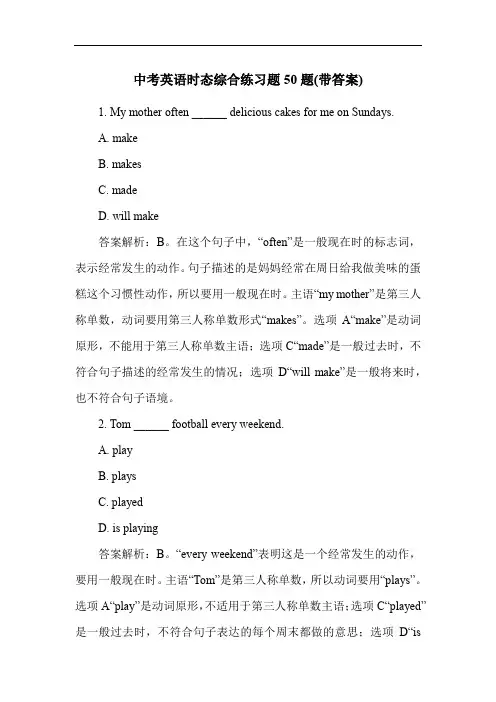
中考英语时态综合练习题50题(带答案)1. My mother often ______ delicious cakes for me on Sundays.A. makeB. makesC. madeD. will make答案解析:B。
在这个句子中,“often”是一般现在时的标志词,表示经常发生的动作。
句子描述的是妈妈经常在周日给我做美味的蛋糕这个习惯性动作,所以要用一般现在时。
主语“my mother”是第三人称单数,动词要用第三人称单数形式“makes”。
选项A“make”是动词原形,不能用于第三人称单数主语;选项C“made”是一般过去时,不符合句子描述的经常发生的情况;选项D“will make”是一般将来时,也不符合句子语境。
2. Tom ______ football every weekend.A. playB. playsC. playedD. is playing答案解析:B。
“every weekend”表明这是一个经常发生的动作,要用一般现在时。
主语“Tom”是第三人称单数,所以动词要用“plays”。
选项A“play”是动词原形,不适用于第三人称单数主语;选项C“played”是一般过去时,不符合句子表达的每个周末都做的意思;选项D“isplaying”是现在进行时,这里不是正在进行的动作。
3. The sun ______ in the east and sets in the west.A. riseB. risesC. roseD. has risen答案解析:B。
这是一个客观事实,太阳从东边升起西边落下,客观事实要用一般现在时。
主语“the sun”是第三人称单数,动词用“rises”。
选项A“rise”是动词原形;选项C“rose”是一般过去时;选项D“has risen”是现在完成时,都不符合客观事实用一般现在时的要求。
4. She ______ to school by bike every day.A. goB. goesC. wentD. will go答案解析:B。
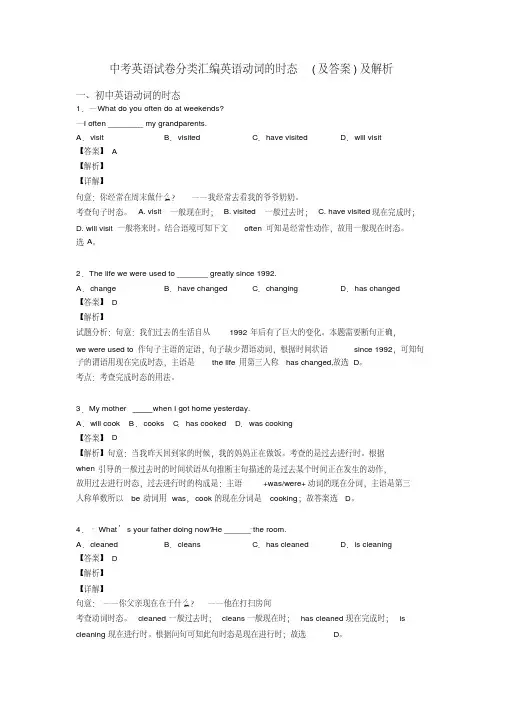
中考英语专项复习专题【动词时代】(附例题以及答案)本章节内容1.动词的基本形式2. 时态的基本框架3.时态判定4.名词在句子中运用1动词的五种基本形式动词主要用来表示动作、状态和性质,而动作和状态的发生有具体的时间和表现方式,这就是英语中动词的时态。
英语中动词的时态由动词的不同形式来表示。
英语动词的五种基本形式为:动词原形、第三人称单数、现在分词、过去式和过去分词。
如:work—works—working—worked—worked。
1.动词的五种基本形式变化表2时态的基本框架常见六种时态的构成及用法(1)一般现在时用法:①现在经常性的状态或动作;②客观事实和真理。
构成:①be+表语;②实义动词作谓语标志词:often, sometimes, usually, always, never,twice a month, every day/week/month/year(every系列)例句:He usually gets to school early.他通常很早到校。
The moon moves around the earth.月亮绕着地球转。
练一练1.认识从实践开始Knowledge practice.2.如果明天下雨,我们就不去公园了。
If it tomorrow,we to the park.【答案】1. begins with.2.rains,won’t go(2)一般过去时用法:表示过去的动作或状态。
构成:①was/were+表语;②实义动词作谓语标志词:a moment ago,just now,ago, yesterday, last night/week/month(last系列)例句:We went to Yunnan last Monday.上周一我们去了云南。
1.She (not visit)her aunt last weekend.2.My friend,Lucy, (study)for the math test and (practice)English last night. 【答案】1.didn’t visit 2.studied practiced(3)一般将来时用法:表示将来的动作或状态。
100道中考英语时态真题1. —Why are you standing here, Mrs. White?—I'm waiting for my son. He________ back from school.A. hasn't comeB. won't comeC. doesn't come【答案】A【解析】考查动词的时态。
由上文语境“我正在等儿子”可知,他没有从学校回来。
故用现在完成时。
选A。
2. —Hello, may I speak to Zhang Jun?—Oh, sorry! He _______ to Guiyang.A. has beenB. has goneC. went【答案】B【解析】考查动词的时态。
Have been to“去过某地回来了”;have gone to“到某地去了”。
句意“他到贵阳去了”。
故选B。
3. My father_______ on business for two weeks. He’ll return in three days.A. has been awayB. leftC. has left【答案】A【解析】由for two weeks可知,本句的时间状语为一段时间,要和延续性动词连用。
leave是短暂性动词,须排除。
故选A。
4. —Do you miss your parent far away?—Yes, very much. They the hometown for over two years.A. leftB. have leftC. were away fromD. have been away from【答案】D【解析】考查动词的时态。
由时间状语for over two years可知,用现在完成时,且动词用延续性的,故选D。
5. —Where is your father?—He______ Australia and he _____ Sydney for two weeks.A. has been to; has been inB. has gone to ; has been inC. has been in; has been toD. has gone to ; has been to【答案】B【解析】考查动词的时态。
中考初中英语语法八大时态总结(附答案)初中英语语法八大时态1.结构肯定句式: 主语+动词原形/动词的第三人称单数+其他否定句式: 主语+(助动词) don't/doesn't +动词原形+其他一般疑问句式: Do/Does+主语+动词原形+其他简略回答: (肯)Yes,主语+do/does (否)No,主语+do/does not缩写形式: don't = do not doesn't = does not例句:He often goes swimming in summer.I usually leave home for school at 7 every morning.2.用法1)表示经常的、习惯性的动作或存在的状态,常与表示频度的副词连用。
常用的频度副词有: always、often、 usually、seldom、never、sometimes, every week (day, year, month…), once a week, on Sundays.频度副词在句中通常放在行为动词之前,系动词、助动词之后。
例如: He often goes swimming in summer.I usually leave home for school at 7 every morning.2)表示主语具备的性格、特征和能力等。
例如:All my family love football .My sister is always ready to help others .Ann writes good English but does not speak well.3)表示客观真理、客观存在、自然现象。
例如:The earth moves around the sun.Shanghai lies in the east of China.4)表示按计划或安排好的,或将要发生的动作,可用一般现在时表将来。
2024中考英语动词时态单选题30题1.I _____ to school by bike every day.A.goB.wentC.goesD.going答案解析:A。
本题考查一般现在时。
句子中有every day 表示每天,是一般现在时的标志。
主语是I,谓语动词用原形go。
B 选项went 是一般过去时;C 选项goes 是第三人称单数形式;D 选项going 不能单独作谓语。
2.She _____ her homework last night.A.doB.doesC.didD.doing答案解析:C。
本题考查一般过去时。
句子中有last night 表示昨晚,是一般过去时的标志。
谓语动词用过去式did。
A 选项do 是一般现在时;B 选项does 是一般现在时第三人称单数形式;D 选项doing 不能单独作谓语。
3.We _____ football on the playground now.A.playB.playedC.are playingD.will play答案解析:C。
本题考查现在进行时。
句子中有now 表示现在,是现在进行时的标志。
现在进行时的结构是be+doing,主语是we,be 动词用are,play 的现在分词是playing。
A 选项play 是一般现在时;B 选项played 是一般过去时;D 选项will play 是一般将来时。
4.My father _____ to work by car every day.A.goB.wentC.goesD.going答案解析:C。
本题考查一般现在时。
句子中有every day 表示每天,是一般现在时的标志。
主语是my father 第三人称单数,谓语动词用goes。
A 选项go 是原形,用于主语是第一、二人称和复数;B 选项went 是一般过去时;D 选项going 不能单独作谓语。
5.I _____ a book yesterday.A.buyB.boughtC.buysD.buying答案解析:B。
中考中考英语专题--动词的时态过去完成时和过去将来时(带答案)专题九动词时态第七讲过去完成时和过去将来时【考点归纳】过去完成时和过去将来时在初中阶段要求学生能够做到理解,因此这两种时态在全国的考题中涉及的很少。
但是这两种时态的学习,可以帮助学生理解完型和阅读文章所表达的隐藏含义,因此建议老师可以根据自己学生的学习情况进行讲解。
【考点1】过去完成时的构成、标志、用法及判定过去完成时的构成过去完成时的标志过去完成时的用法间,而且动作尚未结束,仍然有继续下去的可能。
(had worked 已有了20 年,还有继续进行下去的可能)3. 过去完成时与表示希望或打算的动词连用,如hope, want, expect, think, suppose, plan, mean, intend等,表示未曾实现的希望或打算。
I had intended to come over to see you last night, but someone called and I couldn't get away.(昨晚我本想去看你的,但有人打电话我走不开。
)4. 用于宾语从句中,当宾语从句的主句为一般过去时,且从句的动作先于主句的动作时,从句要用过去完成时。
He told me that he had written a new book. (had written 发生在 told 之前 )5. 过去完成时是一个相对的时态,表示的是“过去的过去”,只有和过去某一时间或某一动作相比较时才使用它,不能离开过去时间而独立存在。
She did a lot of training because she had never sailed.(never sail在do training 之前)过去完成时的判定1. 时间状语By(the end of)/before + 过去的时间点等By nine o’clock last night, we had got 200 pictures from the spaceship.2. “过去的过去”过去完成时必须有过去的时间或动作作为参考When I got to the station, the train had already left.3. 上下文语境根据上下文动作的时间先后判断I met Wang Tao in the street yesterday. We hadn't seen each other since he went to Beijing.过去完成时与一般过去时的区别1. 时间状语不同过去完成时强调“过去的过去”;一般过去时只强调过去某一特定的时间。
中考真题:英语动词时态语法第一部分:中考解析第二部分:中考真题1.— Did you see a girl with an English book in her hand pass by just now?—No, sir. I a magazine.A.read B.am reading C.was reading D.would read全面解析:——你刚才看见一个女孩手里拿着一本英语书吗?——没有,先生。
我在看杂志。
根据句意语境,可知“我”刚才正在看书所以没看到那女孩,需用过去进行时,结构:was/were+doing,主语是I,be动词需用was,故选C。
2.—Recently, school violence ________ in some schools.—Luckily, our government has carried out some policies to stop it.A.has appeared B.appeared C.will appear全面解析:——最近,学校暴力事件在一些学校已经出现了。
——幸运的是,我们的政府已经实施了一些政策来阻止它。
根据recently近来,最近,可知用现在完成时,has done,故选A。
3.—Do you think if Robert will go to the zoo tomorrow?— I think he will go if he ________ too much homework.A.don't have B.won't have C.doesn't have全面解析:——你觉得罗伯特明天会去动物园吗?——如果他没有太多功课,我想他会去的。
if引导的条件状语从句,主句是将来时,那么条件状语从句用一般现在时表将来,即主将从现。
根据he will go,一般将来时,可知从句用一般现在时,主语是he,谓语动词是行为动词,否定句借助于助动词doesn't,故选C。
最新中考英语谓语动词填空(1) There is a beautiful island located(位于) at the outer east side of the Zhujiang River mouth, which(1)______(call) Hong Kong. It lies to the west of Macao and (2)________(face) to the South China Sea. On the north it is connected(相连) with the Shenzhen Special Economical Zone. It (3)__________(cover)about 1,075 square kilometers (平方公里)and includes three main parts—Hong Kong Island, Kowloon Peninsula(半岛) and New Territories. There are more than six million people in Hong Kong, of which about 98 percent are Chinese. Its weather is suitable and its scenery(风景) is very beautiful. Although its area isn’t very large, its economy(经济)(4)_________(develop)quickly. Today’s Hong Kong (5)___|__ already________ (become) the famous heart of the international trade, finance(金融), shipping, travel and information. It (6)_______(keep) the foreign trade relations with over 170 countries. It has a lot of skyscrapers(摩天大楼) and docks. It attracts several million travelers all over the world. About 109 years ago, Hong Kong (7)_______ (occupy) (强占) by the English invaders (侵掠者)and (8)______(rule) for nearly one century. This is the great shame(耻辱) for the Chinese nation. On July 1, 1997, Hong Kong returned to the embrace(怀抱) of our motherland again. This is one of the greatest events in the 20th century. It (9)_________ (end) the English rule. It shows that Chinese people have wiped out the shame. It(10) _______(write) in the historical records forever.
最新中考英语谓语动词填空(2) Once there lived an old man in a town. He always 1___ (forget) a lot of things. So his wife always had 2_______ (say) to him, “3_____ _____ (not forget) this.” One day, he went on a long trip alone. Before he left home, his wife said, “ Now you 4___ (have) all these things. They are what you 5_____ (need) for your trip. 6 ___ (take) care of your things during the trip.” He went to the station. He bought a ticket and got on the train with it. About an hour later, the conductor began 7___(check) the tickets. He came to the old man and said, “Will you please show me your ticket?” The old man looked for his ticket in all his pockets, but he 8___ (not find) it. He was very worried. “I can’t find my ticket. I really bought a ticket before I got on the train,” said the old man. “I think you are right. I believe you 9____ (buy) a ticket,” said the conductor kindly. But the old man still looked worried and said sadly, “You don’t know why I am worried. If I don’t find my ticket, I 10_____ (not remember) my station. Where am I going?”
最新中考英语谓语动词填空(3) Bananas don’t grow on trees. They grow on a thick stalk(茎) that (1)________(look) just a little like a stalk of corn. The stalk is soft enough (2)_______( cut) with a knife. It takes about a year before bananas are ready to be picked. Some are as small as fingers. Others are as long and thick as men’s arms. Some banana plants grow as tall as a house — even taller! Not all bananas are eaten as fruit. Some never get sweet, and they (3)______(cook) as a kind of vegetable. People in most countries never see a banana until it reaches the store. But if you visited a country where it’s hot and rains a lot all the year, you(4)________(see) a banana plantation(种植园), a large farm where bananas grow. The tasty fruit doesn’t come from a seed (种子)but from a root(5)_______( plante) deep in the ground. First a stalk pushes up into the air. Then leaves (6)________(appear). In the beginning the banana plant grows very fast—sometimes as much as the length(长) of your feet in one night. Soon, sweet-smelling flowers appear, and when their flowers drop off, bananas begin to grow. As they get bigger, bananas start(7)_______( turn) up. It looks as if they’re growing upside down!Bananas are ready to eat when they turn soft and yellow. But they(8)_________( pick) long before this — when they’re hard and bright green. This is because bananas have to travel many miles before they arrive at a store. On trucks and boats and trains bananas travel all over the world. There are special boats just for bananas and special trains that keep them just cool enough so that they (9)______(get) ripe while(10)_________( travel). If bananas are picked when they are ripe, they will spoil(变坏) on the way.
最新中考英语谓语动词填空(4)